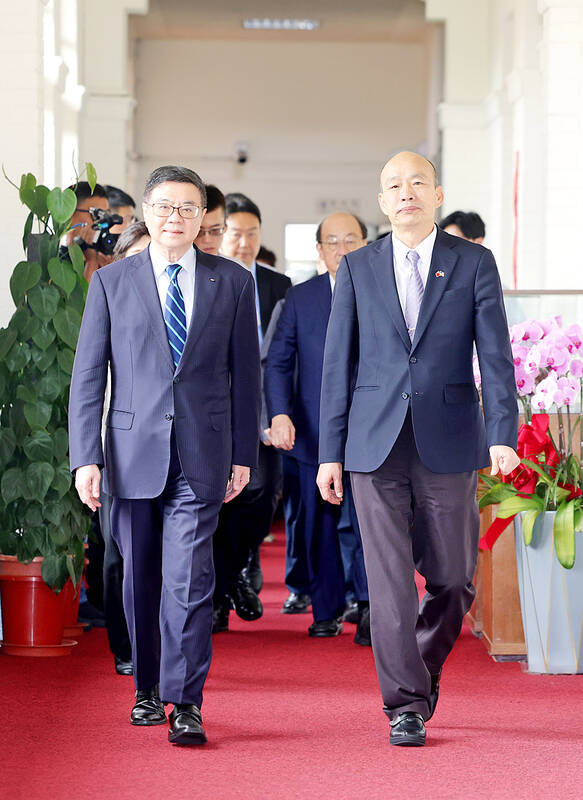Premier Cho Jung-tai (卓榮泰) yesterday reiterated his promise to return a set of controversial reform bills to the Legislative Yuan for reconsideration, saying that the Cabinet is constitutionally obligated to do so if the new laws would be hard to enact.
Under Article 3 of the Additional Articles of the Constitution, the Cabinet can return a bill to the legislature for reconsideration within 10 days of its submission if it deems it difficult to execute.
If more than half of the total number of lawmakers uphold the original bill, the Cabinet must accept it. If they cannot reach a resolution within 15 days after the session begins, the bill becomes invalid.

Photo: CNA
Under the Act Governing the Legislative Yuan’s Power (立法院職權行使法), the legislature can also invite the premier to attend the review to explain the Cabinet’s reasoning.
Speaking to the Democratic Progressive Party (DPP) caucus yesterday, Cho reiterated plans to return the bills that were approved by the legislature on Tuesday.
Once the Cabinet receives the bills and determines that they are difficult to execute, it is its responsibility to return them to the legislature as mandated in the Constitution, he said.
He also voiced support for the caucus’ plan to file for a constitutional interpretation.
Writing on Facebook late on Tuesday, Cho decried the amendments, saying they infringe on constitutionally defined rights, separation of powers and the principle of legal certainty.
“The precious thing about democracy is that consensus is built through discussion and communication,” he wrote.
By sending the set of bills back, the Cabinet does not intend to exacerbate conflict, but to give the legislature another chance to scrutinize and perfect the bills, and to respond to public concerns, he said.
If the Cabinet formally returns the bills for reconsideration, it would be the 14th time in the nation’s history it has done so.
Since 2000, the Cabinet has sent six bills back to the legislature. Four were during former president Chen Shui-bian’s (陳水扁) tenure, and three of them failed to pass.
Of the two returned during former president Ma Ying-jeou’s (馬英九) tenure, both passed, while no bills were returned under former president Tsai Ing-wen (蔡英文).
President William Lai (賴清德), speaking in his capacity as DPP chairman, said that the party respects and supports decisions by the Cabinet to return the bills and the party caucus to file for a constitutional interpretation.
Meanwhile, DPP spokesman Justin Wu (吳崢) said that Lai had previously said he would be willing to give a state of the nation address at the legislature — as required in one of the reform bills — if it was conducted in a legal and constitutional manner.
Additional reporting by Chen Yun and CNA

ENDEAVOR MANTA: The ship is programmed to automatically return to its designated home port and would self-destruct if seized by another party The Endeavor Manta, Taiwan’s first military-specification uncrewed surface vehicle (USV) tailor-made to operate in the Taiwan Strait in a bid to bolster the nation’s asymmetric combat capabilities made its first appearance at Kaohsiung’s Singda Harbor yesterday. Taking inspiration from Ukraine’s navy, which is using USVs to force Russia’s Black Sea fleet to take shelter within its own ports, CSBC Taiwan (台灣國際造船) established a research and development unit on USVs last year, CSBC chairman Huang Cheng-hung (黃正弘) said. With the exception of the satellite guidance system and the outboard motors — which were purchased from foreign companies that were not affiliated with Chinese-funded

PERMIT REVOKED: The influencer at a news conference said the National Immigration Agency was infringing on human rights and persecuting Chinese spouses Chinese influencer “Yaya in Taiwan” (亞亞在台灣) yesterday evening voluntarily left Taiwan, despite saying yesterday morning that she had “no intention” of leaving after her residence permit was revoked over her comments on Taiwan being “unified” with China by military force. The Ministry of the Interior yesterday had said that it could forcibly deport the influencer at midnight, but was considering taking a more flexible approach and beginning procedures this morning. The influencer, whose given name is Liu Zhenya (劉振亞), departed on a 8:45pm flight from Taipei International Airport (Songshan airport) to Fuzhou, China. Liu held a news conference at the airport at 7pm,

Taiwan was ranked the fourth-safest country in the world with a score of 82.9, trailing only Andorra, the United Arab Emirates and Qatar in Numbeo’s Safety Index by Country report. Taiwan’s score improved by 0.1 points compared with last year’s mid-year report, which had Taiwan fourth with a score of 82.8. However, both scores were lower than in last year’s first review, when Taiwan scored 83.3, and are a long way from when Taiwan was named the second-safest country in the world in 2021, scoring 84.8. Taiwan ranked higher than Singapore in ninth with a score of 77.4 and Japan in 10th with

GRIDLOCK: The National Fire Agency’s Special Search and Rescue team is on standby to travel to the countries to help out with the rescue effort A powerful earthquake rocked Myanmar and neighboring Thailand yesterday, killing at least three people in Bangkok and burying dozens when a high-rise building under construction collapsed. Footage shared on social media from Myanmar’s second-largest city showed widespread destruction, raising fears that many were trapped under the rubble or killed. The magnitude 7.7 earthquake, with an epicenter near Mandalay in Myanmar, struck at midday and was followed by a strong magnitude 6.4 aftershock. The extent of death, injury and destruction — especially in Myanmar, which is embroiled in a civil war and where information is tightly controlled at the best of times —